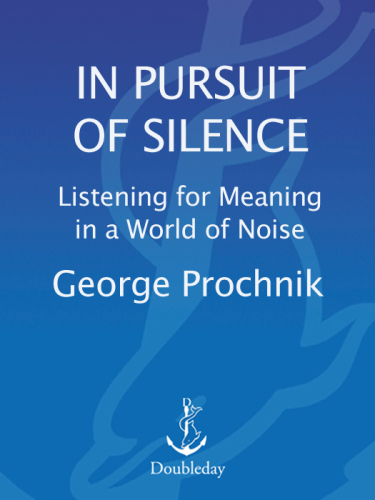
In Pursuit of Silence
Listening for Meaning in a World of Noise
کتاب های مرتبط
- اطلاعات
- نقد و بررسی
- دیدگاه کاربران
نقد و بررسی

February 15, 2010
Silence is golden, but noise is more stimulating in this smart if occasionally overearnest rumination on our modern soundscape. Prochnik (Putnam Camp
) is at his best investigating the culture of noise—the traffic, TV, and iPods—that ravages our hearing and peace of mind. He tunes in with a sprightly mix of science—babies, it seems, have evolved to squall at pitches the human ear finds maximally annoying—and reportage, visiting a designer who concocts soundtracks that make Abercrombie & Fitch patrons spend (“loud, strong, fast beats pump energy—and social conformity” into soldiers and teen shoppers alike) and the subculture of competitive loud car-stereo tournaments. (“I didn't hear sound,” the author observes of one window-shattering system. “I just experienced my bones and heart bursting apart through my skin.”) Prochnik's explorations of silence—visiting a Trappist monastery, searching for oases of quiet in Manhattan—are more muted, veering between health advice (meditation improves the brain) and muzzy spirituality. (“The more we hear nothing, the more nothing we hear,” intones a sniper.) Silence is good for falling asleep, but Prochnik's attentive take on noise keeps us wide awake.

February 15, 2010
Prochnik (Putnam Camp: Sigmund Freud, James Jackson Putnam, and the Purpose of American Psychology, 2006) investigates the delicate cultivation of silence and the less-delicate eruption of its foe, noise pollution.
For the author, it wasn't only that noise itself had gotten to him, but that it robbed him of something precious: silence, that fertile pause offering rest, renewal and a distilled awareness. Prochnik first visits a Trappist monastery, where he comes to appreciate that silence is a radical confrontation with oneself, a nod toward the"idea of an incommensurability between truth and our powers of expression." Shamans practicing in the prehistoric caves of France and Spain had a different relationship to sound, where noise-making in the underground galleries reverberated and echoed to induce a state of"high emotion and minimal reason." In an act of participatory courage, Prochnik submits to the decibel madness of superstereo boom cars, which are fast approaching the point where their sheer noise energy will crush the immediate atmosphere to the point of eliminating vibration, and thus—oddly—silencing itself. But Prochnik is here in praise of silence, not sonic blasts (though he finds some boom-car aficionados to his liking). In its pursuit he takes a turn through the evolutionary biology of hearing, the fight against Muzak and the checkered history of noise-pollution legislation. He also visits Gallaudet College, where a student tells him,"[o]ur ideas concentrated in ourselves, so to speak, necessarily incline us toward reflectiveness and meditation," and immerses himself in a sensory-deprivation tank and the tranquility of a tea-house garden. In championing silence, its workings as mysterious and salubrious as sleep, he calls for"more spaces in which we can interrupt our general experience of noise."
A lucid, balanced appreciation of silence's solemn tonic.
(COPYRIGHT (2010) KIRKUS REVIEWS/NIELSEN BUSINESS MEDIA, INC. ALL RIGHTS RESERVED.)

May 15, 2010
Prochnik ("Putnam Camp: Sigmund Freud, James Jackson Putnam, and the Purpose of American Psychology") covers a topic of growing interesthow to find quiet in our noise-polluted world. Unlike Gordon Hempton and John Grossmann ("One Square Inch of Silence"), Prochnik is not writing with an agenda; he also avoids being political or superficial. Instead, he carefully explores the issue from multiple directions to understand why some of us crave quiet and others do not and the implications of constant noise on our hearing and behavior as well as on society at large. Prochnik visits a monastery to discuss silence with monks and interviews medical, psychological, and acoustic specialists. He also examines soundscaping, noise mapping, deaf architecture, our speech and how our minds process silence, and the "noise" our ears hear if we are deaf or in a completely quiet environment. He concludes that the conflict between silence and noise will not disappear, that a small expenditure on expanding silence provides larger returns than a huge expenditure on reducing noise, and, most important, that noise is changing our society. VERDICT This significant book will appeal to readers who enjoyed Anne LeClaire's "Listening Below the Noise" and Sara Maitland's "A Book of Silence" as well as fans of Malcolm Gladwell and Daniel Gilbert.Michael D. Cramer, Schwarz BioSciences, RTP, NC
Copyright 2010 Library Journal, LLC Used with permission.

April 15, 2010
Starting with a visit to a Trappist monastery and moving through shopping malls, city gardens, and even an extreme car-audio competition, Prochnik amiably escorts readers through investigations into silence and noise in modern life. Name-dropping everyone from the expected (Thoreau) to the surprising (spacewalker Suni Williams), he asks questions of those who design the sound systems that make us spend at Abercrombie & Fitch as well as sound-proofing equipment exhibitors at Noise Con. Some prescient history is discussed, including the successful battle for quiet by Julia Rice (the Queen of Silence) on the Hudson River in the early twentieth century. Mostly Prochnik stays in the present, where he finds that people are accepting higher and higher noise levels, even though they crave quiet. Perhaps most illuminating is his time spent with the Deaf community at Gallaudet University, who offer an unexpectedly different perspective as they live without the impact of noise. Elegant and understated, this thoughtful look at rarely considered aspects of everyday life reveals an often unrecognized cost of modern living.(Reprinted with permission of Booklist, copyright 2010, American Library Association.)

























دیدگاه کاربران